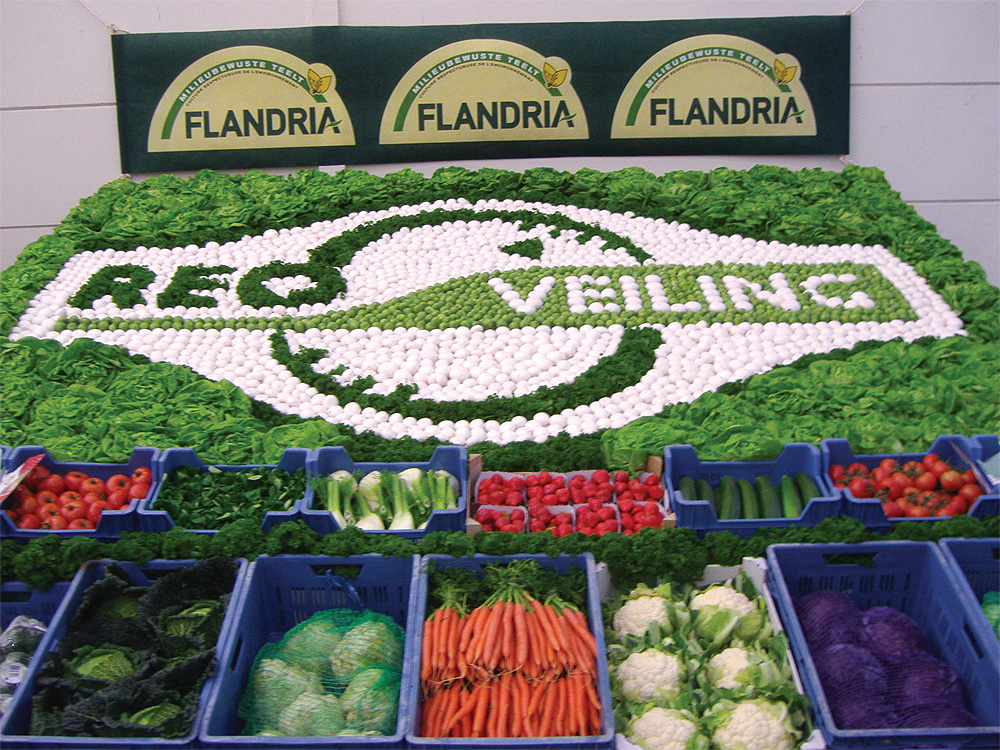
REO Veiling
Seal of quality
To ride out the effects of the economic downturn, Belgian vegetable auction house, REO Veiling is focusing on greener packaging solutions for its produce
Founded in 1942, REO Veiling is the agricultural auction market for the Belgian city of Roeselare and the surrounding area. Functioning as a co-operative fruit and vegetable auction where over 3000 producers work together, the business markets around 60 different types of vegetables, all under optimal conditions. The products, fresh from the land, are auctioned six times a week. Situated right at the heart of Belgium’s foremost vegetable-growing region, the company’s base at Roeselare houses a market garden, which generates quality produce, including wholesome nutritious fruits and vegetables grown in respect of the principles of good agricultural practice (GAP).
Established during the difficult times of the Second World War, REO Veiling’s aim was to address the burgeoning fruit and vegetable culture, which at the time was steadily developing into a unique phenomenon in mid west Flanders. The inevitable expansion of REO Veiling made a frequent change of location an unavoidable consequence: first it was located in Linkervaartkaai, before moving to Kattestraat. Eventually permanent premises were found, which are bordered by three main roads, Diksmuidsesteenweg, Groenestraat and Oostnieuwkerksesteenweg.
The present supply hall and auction room have both been in operation since April 1991. Located on the ‘De Klauwaertbeek’ industrial estate, they cover a 20-hectare surface area, and the packaging department and buyers’ depots are located along Diksmuidsesteenweg, taking up nine hectares. Today sales operations are performed by Dutch auction. In the past, individual sales were used, but this sales method has now been largely replaced by block sales. This particular method involves the same product being supplied by different growers. In the composition of that block, the quality is of crucial importance and is determined by the quality controller.
The business places a high focus on quality, and Dominiek Keersebilck, commercial manager at REO Veiling, explains how REO Veiling ensures the products at its auctions meet its high standards: “We have books of specifications, which our growers know so they can implement a first quality control at their farm or production area. We use the quality label Flandria, which is our main guarantee of quality. Additionally we have several systems, one of which we use for tracking and tracing and also to manage our warehouse as an auction-oriented warehousing system. This system allows us to track and trace the exact locations of the goods from the greenhouse at whichever particular farm right up to its delivery.”
With environmental concerns becoming ever more important for businesses in all industries across the world, packaging has become a hot topic in the food industry. REO Veiling always aims to be at the cutting edge of new packaging innovations, constantly reinforcing its commitment to reducing the environmental impact of its business operations. Dominiek describes important developments in this area: “In 1995, the light-blue Europool crate was introduced. The crate is widely used by a large number of Belgian, Dutch, German, French and Spanish producer’s organisations but also by a lot of European wholesalers. In so doing, REO Veiling took a major step towards simplifying the logistical process involved in the sale of fruits and vegetables. An added benefit of this crate is that it can be reused many times, thereby reducing the volume of waste packaging.”
Currently, some 80 per cent of all packaging units used are EPS crates. When the EPS crate was introduced, it was laid down from the outset that used crates had to be washed twice in three cycles. A crate washing machine was bought with a washing capacity of 4000 crates per hour to speed up the process, and REO Veiling also commissioned the construction of the first automatic crate-washing machine in Europe.
Despite recent progression following these promising developments, REO Veiling has not been 81immune to the damaging effects of the financial crisis. Dominiek explains how the recession has impacted on the business: “We have already felt the economic pressure, as some of the vegetables we stock and sell have been affected. Mushrooms, for example, are our third largest product and very important for us, but we have struggled exporting to the UK for example, because of the devaluation of the British pound. Because of the strong euro we are under pressure to export to other markets.”
Despite these setbacks, the business still continues to grow in its main markets, and the future looks positive. Dominiek concludes by outlining the plans for REO Veiling’s future development: “Our main aim is to work even harder and focus on forming and maintaining long-term relationships with no only our buyers, but also with the end consumer. Moving forwards, we will continue to invest in our quality label, Flandria, as well as researching new packaging solutions. We are willing to invest a lot in this area and that will contribute to improving the long-term relationships we have with our producers and our buyers. These companies are located across the world and so we want to strengthen bonds with export companies with a view to extending our business throughout Europe, and possibly into new markets like the US and South East Asia.”